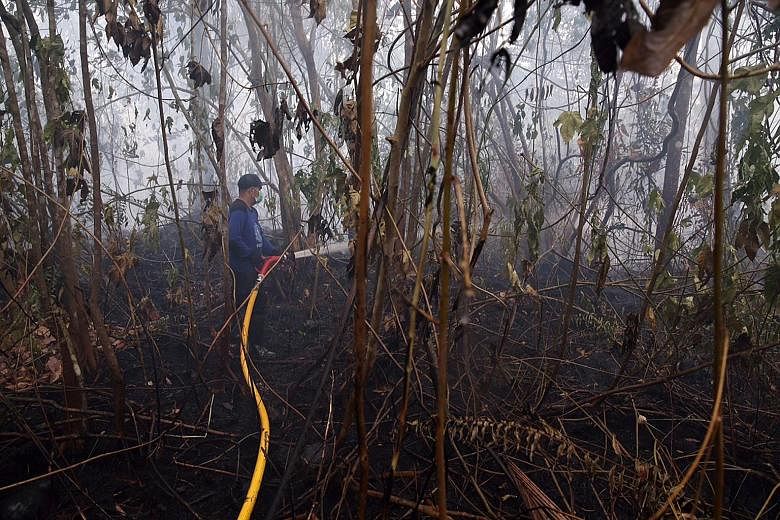The annual haze crisis is here to stay despite one of Indonesia's best efforts in recent years to counter the illegal forest fires that cause it.
Indonesian President Joko Widodo told the BBC in a report out yesterday that he needs time to tackle the issue, which has affected the lives of millions across his country, as well as Singapore and Malaysia.
The illegal fires on peatlands, including concession areas marked for cultivation by plantation companies, are "not a problem that you can solve quickly", said Mr Joko.
"You will see results soon, and in three years, we will have solved this."
Some 3,700 soldiers and nearly 8,000 policemen have been deployed to fight forest fires in Kalimantan and Sumatra islands.
The national police have arrested many suspects and commenced probes against several plantation firms in connection with the use of outlawed slash-and-burn techniques to clear plantation land.
Mr Joko has also ordered canals with dams in fire-prone areas to be built to prevent peatlands from draining out during the dry season and becoming tinder for fires.
While observers agree that these are by far the most wide-ranging efforts by any Indonesian government in dealing with the crisis, which has sent air pollution to at times hazardous levels, most remain sceptical over Mr Joko's timeline.
Professor Asit K. Biswas from the Lee Kuan Yew School of Public Policy said the issues surrounding the haze crisis are so complex that it cannot be resolved in three years.
A key factor is that Indonesia does not have the data or expertise "to fully appreciate even the extent and magnitude of the problem", said the expert on resource and development-related issues.
"This includes who are the people responsible for it, why is it happening and what are the solutions that need to be implemented and who will implement them," he added.
The effects of climate change on regional weather patterns are also not on the side of Indonesia.
Some climate experts have warned that the extreme dry weather from the El Nino phenomenon will continue to cause peatlands to burn more readily this year.
El Nino - which started in March this year - typically lasts nine months but some say indications are that it is set to peak only in November and could possibly last well into the first half of next year.
Indonesia's National Disaster Management Agency said last week that data from 2006 to last year shows that hot spots typically appear between June and October. Its spokesman Sutopo Purwo Nugroho had also said earlier that the prevailing dry spell may mean they may continue to burn until next month.
Assistant Professor Winston Chow of the National University of Singapore's geography department is of the view that while climate change will not cause more fires or hot spots, it will create conditions that favour hot spots to form.
"There's a subtle but important difference and hence climate change must be factored into long-term planning for mitigating the haze crisis," he added.
Singapore and Malaysia have offered to help Indonesia fight the forest fires. Defence Minister Ng Eng Hen, who was at high-level talks with his Indonesian counterpart on Monday, said he was reassured that Mr Joko has personally taken note of the issues related to the haze crisis.
"I wish him every good outcome as they approach this in a more determined way to prevent the fires," said Dr Ng. "And I am glad that their primary motivation is for the health of their own citizens."


